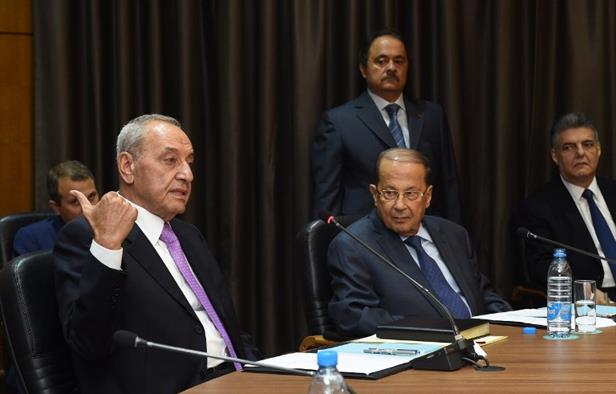Divided we stand
Michael Young/Now Lebanon/March 10/16
It’s revealing that a common notion in Lebanese politics during the past two decades has been frequently ignored. The notion is that the most popular politician in each community is entitled to take over the highest post reserved for the community. Yet when did that really apply? Presidents Elias Hrawi and Emile Lahoud could hardly claim to be popular in their communities—they didn’t even manage to win majorities in the municipal elections in their hometowns. Even Michel Sleiman, hardly a divisive figure, was never embraced by Maronites, so antipathetic was he to the supporters of Michel Aoun. In the Muslim communities, things were different. Rafik Hariri was the preeminent Sunni figure when he was prime minister, and even when he wasn’t. After elections in 2005, the Shiite community made it clear in no uncertain terms that Nabih Berri was the communal choice for the speakership of parliament, and, therefore, that he was the man to elect. Most Lebanese may not have heard of the principle of “Cuius regio, eius religio,” from the Peace of Augsburg, which put an end to a long period of conflict between Catholics and Protestants in the Holy Roman Empire. What it means, literally, is, “Whose realm, his religion.” In other words it was up to the prince to decide the religion of his principality. In Lebanon, we have this in reverse: If main posts in the state are principalities, it is for the communities to decide whom the prince should be.
But just as the Peace of Augsburg recognized the sovereignty of principalities, in Lebanon the belief that posts must be decided by communities for which they are reserved has reinforced communal sovereignty, at the expense of a unified Lebanese state. Increasingly, Lebanon is looking like a federalism of communities, generating the divisive reflexes that go with it. Nowhere has that been more visible than in the continued disagreement over a presidential candidate. One of the major arguments against Sleiman Franjieh is that he does not enjoy the same communal backing as Michel Aoun, therefore he is not as legitimate a candidate. Indeed, that was the subject of disagreement in the dialogue session this week, when Franjieh and Gebran Bassil got into an altercation over representation.
Who was right? Franjieh insisted that he had communal representation, and could point to the fact that if an open election were held today, he would win a majority. In other words he had legitimacy within his own community, but also could appeal across confessional lines to non-Christians. Given that the president’s role, according to the constitution, is to be a “symbol of the nation’s unity,” Franjieh’s argument was strong. However, Bassil could point to the fact that if a president symbolizes national unity, then a prerequisite of this is that he be able to speak for his own community, not simply satisfy the representatives of non-Christian communities. He could also recall that when Saad Hariri was ousted in 2011 by Hezbollah and Aoun, the Sunnis felt that this undermined a pillar of Lebanon’s consensual power-sharing system. That would not explain why the Aounists helped remove Hariri, but it would sustain their argument that Aoun merits to be president.
However, the record since the end of the war in 1990 is one of rank hypocrisy. Representation has invariably been a function of political power plays. When the Syrians turned against Rafik Hariri in 1998, he was removed from office. When they, the Aounists and Hezbollah did so against Saad Hariri in 2011, he too had to walk. For 26 years Christian preferences have been largely dismissed, because the community did not have the means, let alone the unity, to impose its choices. Only Berri has time and again embodied the idea that the communal choice for a top post must be endorsed by other communities, and only because he was supported by Hezbollah. There is no easy solution to this dilemma, because the three top posts in the state, by definition, must represent the whole nation, not merely their communities. And yet when some communities have backed candidates for reserved posts, they have usually justified their decision by insisting that their favorite enjoyed, above all, communal legitimacy.
Perhaps the dilemma comes from the fact that Lebanese have lost all sense of their nation’s meaning. When the National Pact was devised in 1943, it was understood that the sectarian system, at least in theory, would gradually be eased out as national unity became more predominant. This was often repeated by a noted ideologue of the Lebanese system, Michel Chiha. He wrote, “the Lebanese must govern in such a way as to alleviate the paradox of their situation; they must ‘last’ long enough to reach a state of ‘permanent’ equilibrium.”
This was a circular way of saying that the divided Lebanese system needed time for the factors pushing toward unification to anchor themselves. Yet the reality is that throughout the past decades, especially after the war began in 1975, the centrifugal forces in society have become stronger, so that today the state is more a loose alliance of communities, whose realities are defined by who has power, than a budding united system. Until the Lebanese better define the state they want, problems such as the disconnect between communal popularity and national legitimacy will continue. Chiha could just as easily have spoken of Lebanon’s schizophrenia in place of its paradoxes—that of a country that cannot decide to be one or many.
**Michael Young is a writer and editor in Beirut. He tweets @BeirutCalling.























